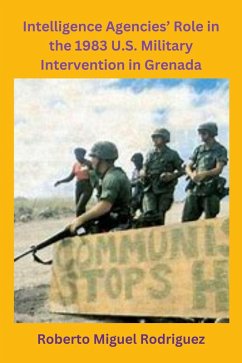
The Battle for Colombia: U.S. Military's Role Combatting Drug Trafficking and Insurgent Groups (eBook, ePUB)

PAYBACK Punkte
0 °P sammeln!
"The Battle for Colombia: U.S. Military Role in Combatting Drug Trafficking and Insurgent Groups" is a comprehensive examination of the United States' military involvement in Colombia's long-standing battle against drug cartels and insurgent groups. This book delves into the complex dynamics of U.S. foreign policy, military strategy, and the challenges of implementing effective counter-narcotics and counter-insurgency operations in a foreign land.The narrative begins with an overview of the historical context that led to the rise of powerful drug cartels and insurgent groups in Colombia, such ...
"The Battle for Colombia: U.S. Military Role in Combatting Drug Trafficking and Insurgent Groups" is a comprehensive examination of the United States' military involvement in Colombia's long-standing battle against drug cartels and insurgent groups. This book delves into the complex dynamics of U.S. foreign policy, military strategy, and the challenges of implementing effective counter-narcotics and counter-insurgency operations in a foreign land.
The narrative begins with an overview of the historical context that led to the rise of powerful drug cartels and insurgent groups in Colombia, such as the FARC and ELN. The book then traces the evolution of U.S. involvement, from early diplomatic efforts and financial aid to more direct military engagement.
Each chapter methodically explores different aspects of this involvement. This includes a detailed examination of key U.S. initiatives like Plan Colombia, the role of U.S. military advisors, the deployment of special forces, and the provision of intelligence and logistical support to Colombian security forces. The author analyzes the strategies employed to disrupt drug production and trafficking networks, as well as the tactics used to combat insurgent groups.
The book also addresses the broader implications of the U.S. military's involvement, including the impact on human rights, the internal displacement of Colombian civilians, and the legal and ethical challenges of foreign military intervention in the war on drugs.
A critical focus of the book is the assessment of the outcomes of U.S. military assistance. It evaluates the effectiveness of various strategies in reducing drug production and weakening insurgent groups, as well as the unintended consequences such as the displacement of drug activities to other regions.
"The Battle for Colombia" also considers the changing nature of drug trafficking and insurgency in the context of globalized criminal networks and discusses the future challenges and strategies for both the Colombian government and U.S. policy makers.
This book is an essential resource for students and professionals in international relations, military studies, and Latin American studies. It provides a nuanced and comprehensive perspective on a key chapter in the history of U.S. foreign military engagements and its impact on regional stability and international drug policy.
The narrative begins with an overview of the historical context that led to the rise of powerful drug cartels and insurgent groups in Colombia, such as the FARC and ELN. The book then traces the evolution of U.S. involvement, from early diplomatic efforts and financial aid to more direct military engagement.
Each chapter methodically explores different aspects of this involvement. This includes a detailed examination of key U.S. initiatives like Plan Colombia, the role of U.S. military advisors, the deployment of special forces, and the provision of intelligence and logistical support to Colombian security forces. The author analyzes the strategies employed to disrupt drug production and trafficking networks, as well as the tactics used to combat insurgent groups.
The book also addresses the broader implications of the U.S. military's involvement, including the impact on human rights, the internal displacement of Colombian civilians, and the legal and ethical challenges of foreign military intervention in the war on drugs.
A critical focus of the book is the assessment of the outcomes of U.S. military assistance. It evaluates the effectiveness of various strategies in reducing drug production and weakening insurgent groups, as well as the unintended consequences such as the displacement of drug activities to other regions.
"The Battle for Colombia" also considers the changing nature of drug trafficking and insurgency in the context of globalized criminal networks and discusses the future challenges and strategies for both the Colombian government and U.S. policy makers.
This book is an essential resource for students and professionals in international relations, military studies, and Latin American studies. It provides a nuanced and comprehensive perspective on a key chapter in the history of U.S. foreign military engagements and its impact on regional stability and international drug policy.
Dieser Download kann aus rechtlichen Gründen nur mit Rechnungsadresse in A, B, CY, CZ, D, DK, EW, E, FIN, F, GR, H, IRL, I, LT, L, LR, M, NL, PL, P, R, S, SLO, SK ausgeliefert werden.













